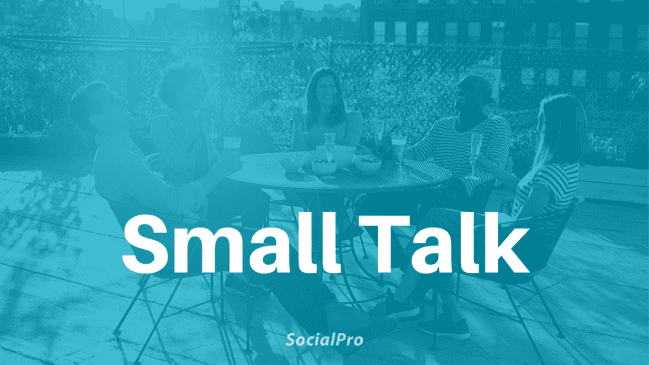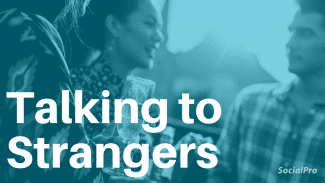The phrase “small talk” sounds like it doesn’t mean much, so it can’t be hard. The truth is, it’s a skill, and it takes practice to be good at it. Once you do, it will make your social life MUCH BETTER. Why? Because every meaningful relationship in life starts with small talk.
In the following steps, we’ll teach you how to talk to anyone, what to talk about, and why small talk is necessary.
So settle in, and let’s dissect small talk and why it’s worthwhile.
Why small talk is necessary
- It shows you want to talk to them. When you make some seemingly meaningless conversation, what you’re really saying is, “Hey, you look interesting. Wanna figure out if we can be friends?” Ice broken. Mildly flattering. Clearly, you don’t think they’re an ogre.
- It shows you’re friendly or at least, you probably won’t hurt them, physically or otherwise.
- It’s a low-risk way of saying you’re interested in getting to know them for a short time at first. Most people are good with this low level of commitment.
- It helps you find out if you have things in common. It’s when we find those things that we might realize that we want to be friends.
- It covers our social needs. Most people prefer to have some interaction with other people, rather than none at all.
- Self-confidence makes you more attractive. Talking to someone first says I’m confident enough to think you’ll probably like me.
- Taking the initiative makes it easier for the other person. You took all the risk. You’ve taken all the fear out of talking to a stranger for the other person. As a result, you have more power to create your social life.
Part 1. Finding things to talk about
1. Try these 7 conversation openers
Use your surroundings or situation to come up with things to say. You can start with something simple, like this:
- Ask a simple question: “Do you know where the closest Starbucks is?”
- Talk about a shared experience: “That meeting/seminar went into overtime.”
- Talk about why you’re there (at the party, at school, the social context): “Who do you know here?”
- Talk about where you are and what’s happening: “I love the decor in this cafe. It makes me want to hang out in those overstuffed chairs for hours.”
- Give a sincere compliment: “Those shoes are awesome. Where did you get them?”
- Ask for their opinion: “How’s the house red wine here?”
- Talk about possible common interests (sports, movies, books, social media) “Do you think the [insert NHL/NBA/NFL team] will get into the playoffs this season?”
Read more here on how to start a conversation.
2. Listen 2/3 of the time – Talk 1/3 of the time
When you’ve just met someone, you can ask them open-ended questions and wait for their answers, roughly 2/3 of the time. The other 1/3 of the time, you respond to their questions and add comments or stories from your life that are relevant to their answers.
Good, engaging conversations go back and forth where both parties take turns sharing and listening to each other.
Here’s an example:
You: “How long does it take you to commute to work?”
Them: “About an hour. I take the train and then walk up from the station.”
You: “I live in the suburbs too. My commute is 45 minutes or 75, depending on train delays.”
Them: “Those delays are killer, right?! It took me an hour and a half both ways most of last week.”
You: “Ya, it’s brutal. I’d drive, but that would take just as long, plus parking.”
Them: “I just got a new car, and I love it, but I wouldn’t drive it every day. I want to keep the mileage down.”
You: “Cool, what kind of car is it?”
In that example, notice the balance between sharing and talking. You’re leading with questions and then adding responses of your own that tell them about you.
A common mistake is to ask questions you’re supposed to ask, and then not be very interested in the answer. Instead, ask questions to truly learn about someone and pay close attention to their answers.
3. Ask open-ended questions
Conversations get more enjoyable when you ask open-ended questions. Anything that can be answered with more than yes/no is a good start.
Here’s an example, “What were you up to this weekend?” can inspire a more interesting conversation than “Was your weekend good?”.
All your questions shouldn’t be open-ended. They take more energy to answer. Use them occasionally when you want more elaborate answers.
More in this article to find out how to keep a conversation going.
4. Be curious
Be genuinely willing to listen and learn. Let your curiosity guide you. If they say they went skiing on the weekend, you could ask, where do they ski? Have they ever taken a skiing trip outside the state or country? Add whether you ski or not. Perhaps you do other winter sports that you could mention?
Here’s where it gets interesting. Now ask them for the emotional layer. What do they like the most about skiing? Do they ever find it scary? Why did they pick that specific resort?
5. Ask for their opinion
It’s nice when someone wants to know what you think. It’s also interesting to learn more about what people think and why. So ask them! Believe me, they will remember that you cared to ask.
Something as simple as this can make people feel important: “I’m thinking of getting a pair of boots. What do you think I should go for Blundstones or Doc Martens?”
It’s an emotional memory, and that is more powerful than a fact-related one. And, you now know them on a deeper level than most work acquaintances.
6. Find common ground
Part of building rapport with someone means finding out where you have similar opinions. It could be with any of the following:
- Agreement on an issue
- The same interest [hobby / career / movies / goals]
- Knowing the same person
- Enjoying a similar background
As you talk, elaborate on your common interest rather than your differences.
7. Approach the common interest from a unique angle
To make the conversation interesting and memorable for you both, you could try adding a bit of emotion and quirk to your common interest questions.
Say you both love cars and new innovation. You could say, “What do you think is the future of cars?” Or “How long do you think it’ll be before they fly?”
8. Share your opinion and be respectful of others
Some opinions are less divisive than others. When meet new people, avoid bringing up politics, religion, and sex. If you jump in and disagree, it could damage your opinion of one another. It can, however, make for interesting conversations after you’ve gotten to know each other.
You can share your opinion on most other topics. Favorite foods, favorite hobbies, your opinion of the decor, music, great places to eat. The key is to keep it positive and share your likes far more than your dislikes. At least at the first meeting.
9. Move on from the current subject by zooming in/out
If you feel like the person you’re talking to is similar to you, or is reasonably open, use your imagination to take the conversation to some less direct places.
You could dig into the details of what you’re talking about. Things like, “What is it about cars that inspires you?” “You’ve mentioned going to Mexico a few times. Where would you go if you went somewhere you’ve never been to before?”
Or you could move the conversation side-ways like this, “Cars are hugely convenient, but what can we do to move to electric faster and affect the environment less?”
Or you could mention related subjects, i.e.: Cars → Road trips. Skiing → All outdoor sports.
10. Use what if-scenarios to get people thinking & talking
This is great if you are sitting beside someone new and have a bit of time to chat, like at a dinner party or a pub get-together.
You can make this as serious or as silly as you like. Here are a few possibilities:
- “What if mobile phones were forbidden?”
- “What if you were given 3 wishes – what would they be?”
- “What if you were a hotdog and you were starving. Would you eat yourself?”
- “What if animals could talk. Which one would be the rudest?”
- “If you could spend eternity alone with one person, who would it be?”
If ‘what if’s’ aren’t your thing, here’s an article on 222 questions to get to know someone.
11. Prep a few safe subjects
A little preparation goes a long way. It could be things you’ve done recently or highlights of current events, the latest memes or videos. Something like, “Did you see porch pirate video on YouTube?” or the TryGuys or YesTheory’s post this week?
Another good tactic is to prep a few stories to tell. Things like, “I went to the basketball game last night.”, “We went sledding on this hill near our house Saturday.” or “I was driving home and…”
Or you can share interesting facts you know about the events, people, places. Comments like, “I hear the speaker at this event is really good. She sells out every year.” Then there is the eternal source of all better conversation starters. F.O.R.D. topics. Family, Occupation, Relaxation, and Dreams.
Remember, talk about what they might be interested in. Not just what you are interested in.
12. Make it rewarding to talk to you by showing that you listen
Listening isn’t enough – you need to communicate that you hear them. This is called active listening. If you subtly check your phone while someone’s talking or scan the room, that will make it less rewarding to speak to you.
Here’s how to show that you listen:
- Listen with intent and sincere interest. Give your partner your undivided attention and listen to understand. This is your only job. If other thoughts jump into your head, like a story you want to tell, shelf it for a minute. Prioritize letting them finish and then ask any relevant questions that came to mind while they were talking.
- Use verbal acknowledgment to show that you are listening while they talk. This could be things like “Interesting,” “Sounds cool!” or “No way!”.
- Use nonverbal acknowledgment that you listen. For example, nodding or saying “Mmmmm” or “uhuh.”
- Ask follow-up questions to keep people talking.“How did that make you feel?” “And then what happened?” “What did you think when that happened?”
- Ask about what you have been told.“So, does that mean he was stuck in the bathroom this whole time?”
- Paraphrase what people said to show you heard them and understand. They: “I lived in Denver all my life and wanted to discover something new.” You: “So you felt like you were kinda done with Denver.” They: “Yes, exactly!“
13. Mention something you’re about to do to end a conversation naturally
If the discussion seems to be going nowhere, there’s no shame in ending it gracefully.
Here are a few pre-canned exits for those times when you can’t get a rhythm going with someone.
- “(Excuse me) I have to go find a seat/say hi to X/get ready to do X.Y.Z…”
- “It was nice talking to you, but I have to [see above].”
- “Great to see you, I’m gonna [something], but we’ll catch up again later.”
Part 2. Becoming better at talking to anyone
Let’s go through some mindsets that can make you a better conversationalist.
Small talk is a means to an end. We are testing the communication waters and opening the door to others to see if they want to connect with us.
Just like you don’t get married on the first date, small talk is your first attempt at friendship. You both need to figure out if there’s enough there to keep the connection up long term.
1. Think about how you want to come across
In your pre-game warm-up, take 15 minutes to think about and visualize (if that helps you – it helps me) how you want to approach the people you meet today and how you are going to feel while you do it.
Be empathetic
Listen with compassion and be emotionally available. If they tell you they’re fighting a head cold at the moment. Say, “That’s too bad, I had a cold 2 weeks ago. I had to take a few days off work just to recover.”
Be open to sharing your thoughts and opinions
Say what you think and feel, as long as it’s appropriate to the situation. Something as simple as, “I love the new furniture in the office kitchen. The chairs are so comfy.” helps others paint a picture of you and can serve as inspiration for new topics.
Assume that people are trustworthy
Show that you trust people by assuming they have the best intentions and that anyone can be a potential friend. Let this be your default view of people unless proven otherwise.
Be enthusiastic and positive
We all have ups and downs, but when we meet someone for the first time or have a casual conversation, they don’t really want to know your cat died. Keep it upbeat. Things like, “I can hardly wait for the weekend. I’m going skiing on Saturday.”
Be curious
Ask for their opinion on something or what they are up to on the weekend. Give them a chance to think and speak their minds.
Don’t take it too seriously
It’s just a bit of conversation. It isn’t a job interview or an oral exam. It either works, or it doesn’t. There are lots of other people or times to keep practicing your social skills.
2. Know that you need practice to improve
Making small talk gets easier the more you practice it.
You have to do it to get better at it. It will not come overnight, but you will see gradual progress over the next few weeks and months.
When you’re better at small talk, social events will not be excruciating, and talking to people becomes enjoyable. Also, the positive response you get from others will make you feel good.
3. Look for connection and social experience
Small talk is kind of like speed dating for friends. You invest a minimal amount of time. You test for common interests, a similar sense of humor, mutual life experiences. If you get a jackpot on any of those items, you can probe deeper to see if this person is worth getting to know long term. By the way, they are thinking the same thing. It’s a two-way street that you’re taking together.
4. See friendship as the result of several positive shared experiences
Every interaction is a shared experience. Learning about someone else is meaningful, and the same applies if they learn something about you. When you have enough positive shared experiences, you become comfortable around that person. And once you have comfort, you can build trust and friendship.
Make sure people enjoy being around you; after that, friendships will follow.
5. Don’t look for approval
When you start talking to someone, try not to think, “How do I make this person like me?”. Instead, think, “I’m going to get to know this person so I can figure out if it’s someone I like.”
When you reframe your interactions like this, you don’t end up in the trap of looking for approval.
It also helps you feel less self-conscious. When you first meet someone, you can make it your mission to learn one unique thing about that person. You don’t only want to ask them questions but share a bit about yourself, too. Later in this guide, I’ll give you some practical advice on how to do this.
6. Use friendly body language
When people start talking to you, they don’t know anything about you. If you’re nervous, it might make you look tense and angry, even if that’s not your intention.
Here are some body language tips before you say “Hi”:
- A relaxed smile
- Easy going eye contact
- Jaw slightly open and unclenched
- Arms at your side rather than crossed
- Face your feet in their direction
- Your voice is warm and strong, and your words are clear (More on how to speak louder)
7. Look at people’s body language to know if they want to talk
It can be hard to tell if someone wants to start talking to you. People can look tense and unapproachable just because they’re nervous or in their head. As long as they aren’t obviously preoccupied with something or someone else, you can try saying something and see how they react.
When you’re making conversation, here are some pointers to know if they might want to end the conversation:
- Their feet are pointing away from you
- They are looking at the things they would rather do (their screen if they want to get back to work, the door if they need to get going, etc.)
- They don’t add to the conversation
- They mention something they’re about to do
They may have other things on their mind and just can’t get into chatting right now. Don’t take it personally or get angry. Excuse yourself politely and move on to something else.
On the other hand, if they are directed toward you and add to the conversation, that’s a good sign that they enjoy talking to you.
Here’s more on how to know if someone wants to talk to you.
8. Think about how you see yourself
Make a conscious decision to work on your social skills and get better at small talk. To do that, it helps to have a certain mindset to ensure success. Here are a few things to adopt before you head out:
- I am in charge of my social life, and I can change it for the better.
- I am the star of my life. I’m not a victim.
- I am sincerely interested in other people.
- I am an interesting and likable person.
- Everyone likes me unless proven otherwise.
9. Make others comfortable first
The easiest way to improve our social skills is to remove the fear and uncertainty in others. I know it seems ironic, we’re the nervous ones. However, most people find meeting people nerve-wracking and stressful.
Have the mindset that you are talking to people to help them out and make them comfortable.
Here’s how you can make people feel comfortable:
- Ask how they are doing
- Be curious and show genuine interest in them
- Show empathy
- Make easy eye contact and smile to assure them that they are accepted
- Ask and use their name
- Remember, and bring up personal details: “How is your wife/dog/boat doing?”
- Paraphrase what people said to show you listened
- Show trust and some vulnerability
- Say what you think and feel
- One interaction won’t make or break your social life. If you mess up, great – you’ve learned something for tomorrow.
Use some strategies to overcome nervousness when you talk to someone
-
- Use the 3-second rule – Approach the person you want to talk to before you can think. Why 3 seconds? Left to our own devices, we will find a reason not to do it (a.k.a. we’ll allow fear to stop us).
- Focus all your attention on the other person. It helps keep your self-critical thoughts away.
- Know that it’s okay to talk to someone despite being nervous. “Courage is being afraid and doing it anyway.”
- Take deep, calming breaths. It helps your body calm down before you approach someone.
- Remind yourself of your strengths. Boost your confidence before going out to a social activity. Remind yourself of the things you do well. Do a few things do what makes you feel good: work out/puzzles/cold shower/read/game.
- Remind yourself that no one cares about your social mistakes as much as you do.
- Share how you’re feeling when you start talking to someone. Nothing earth-shattering, just something honest and open. “I usually don’t step up to people, but you looked pretty interesting.”
- Practice. You won’t be perfect the first or the fifth time, but you will get incrementally better every time. Say to yourself: “The outcome of this interaction isn’t important. What’s important is that I practice”. That can take some of the pressure off you to succeed.





Nice article.
Now that I feel freer, I want to make lots of new acquaintances and a handful of true friends.
Excerpt from this article: “Small talk is kind of like speed dating for friends. You invest a minimal amount of time. You test for common interests, a similar sense of humor, mutual life experiences. If you get a jackpot on any of those items, you can probe deeper to see if this person is worth getting to know long term.” Interesting and spot-on way to look at it.
Thanks very much for these conversation tips. It’s helpful.